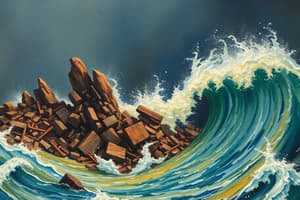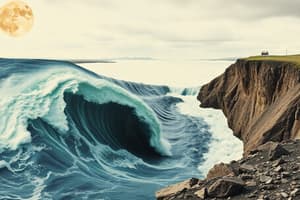Podcast
Questions and Answers
Which geological event is least likely to directly cause a tsunami?
Which geological event is least likely to directly cause a tsunami?
- A large earthquake with an epicenter under the ocean.
- A strong hurricane far out at sea. (correct)
- A landslide near the coast.
- An underwater volcanic eruption.
A tsunami is most accurately described as which of the following?
A tsunami is most accurately described as which of the following?
- A single, massive wave that crashes onto the shore.
- A large, spiraling storm system over the ocean.
- A series of waves caused by the displacement of a large volume of water. (correct)
- A sudden, temporary increase in sea level during a storm.
Why do underwater explosions have the potential to generate tsunamis?
Why do underwater explosions have the potential to generate tsunamis?
- Explosions create a vacuum that sucks water inwards, forming a large wave.
- Explosions heat the water rapidly, causing it to expand and create a wave.
- Explosions always trigger large earthquakes.
- Explosions displace a large volume of water, creating a disturbance. (correct)
Which of these factors would have the LEAST impact on the SIZE of a tsunami wave?
Which of these factors would have the LEAST impact on the SIZE of a tsunami wave?
If a large earthquake occurs near a coastline, what is the most prudent immediate action for people in coastal areas?
If a large earthquake occurs near a coastline, what is the most prudent immediate action for people in coastal areas?
How does the speed of a tsunami change as it approaches shallower coastal waters?
How does the speed of a tsunami change as it approaches shallower coastal waters?
Why can tsunamis be dangerous even if the initial wave is not particularly large?
Why can tsunamis be dangerous even if the initial wave is not particularly large?
What characteristic of tsunamis allows them to travel long distances across oceans with minimal energy loss?
What characteristic of tsunamis allows them to travel long distances across oceans with minimal energy loss?
What is the primary reason that a relatively small volume of water displacement can sometimes result in a large tsunami?
What is the primary reason that a relatively small volume of water displacement can sometimes result in a large tsunami?
A tsunami is likely to occur after which of these events?
A tsunami is likely to occur after which of these events?
Which activity is LEAST likely to cause a tsunami?
Which activity is LEAST likely to cause a tsunami?
Why are tsunamis sometimes referred to as 'seismic sea waves'?
Why are tsunamis sometimes referred to as 'seismic sea waves'?
What is the most important reason for establishing tsunami warning systems?
What is the most important reason for establishing tsunami warning systems?
What property of a tsunami wave remains relatively constant as it travels across the open ocean?
What property of a tsunami wave remains relatively constant as it travels across the open ocean?
What is a key difference between wind-generated waves and tsunami waves?
What is a key difference between wind-generated waves and tsunami waves?
How does the period (time between waves) of a tsunami typically compare to that of a normal ocean wave?
How does the period (time between waves) of a tsunami typically compare to that of a normal ocean wave?
Why might a tsunami first appear as a receding of the ocean from the shore?
Why might a tsunami first appear as a receding of the ocean from the shore?
Which of the following human activities can increase the risk of tsunami damage in coastal areas?
Which of the following human activities can increase the risk of tsunami damage in coastal areas?
What information is most critical to include in a public service announcement regarding tsunami safety after a significant offshore earthquake?
What information is most critical to include in a public service announcement regarding tsunami safety after a significant offshore earthquake?
Why is deep ocean monitoring important for tsunami detection?
Why is deep ocean monitoring important for tsunami detection?
Flashcards
Tsunami
Tsunami
A series of waves caused by a large volume of water displacement, typically in an ocean or large lake.
Causes of tsunamis
Causes of tsunamis
Earthquakes, volcanic eruptions, and underwater explosions cause this natural disaster.
Study Notes
- A tsunami is a series of waves in a body of water.
- They are caused by the displacement of a large volume of water.
- This generally occurs in an ocean or a large lake.
- Earthquakes can generate tsunamis.
- Volcanic eruptions can generate tsunamis.
- Underwater explosions can generate tsunamis.
- These explosions can occur above or below water.
Studying That Suits You
Use AI to generate personalized quizzes and flashcards to suit your learning preferences.





